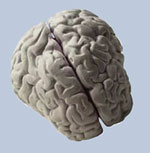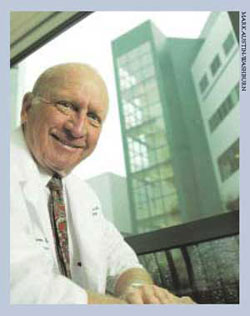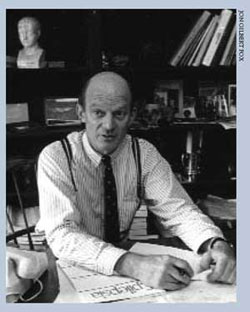Development
Honoring the Past, Shaping the Future
By Barbra Alan
Founder of the neurology section at Dartmouth-Hitchcock Medical Center. Skilled clinical neurologist. Gifted teacher. Dr. Alexander Reeves, now a professor emeritus of neurology at Dartmouth Medical School and the former chief of neurology at DHMC, was all of these and more.
Which is why Dr. Peter Williamson- himself a professor of neurology at DMS as well as the founder and director of DHMC's epilepsy program-and his wife, Susan, recently made a $1-million commitment toward the creation of the Alexander Garden Reeves, M.D., Professorship in Neurology. Once established, the professorship will recognize and reward a faculty member like Reeves-someone whose teaching epitomizes DMS's educational mission, whose scholarship contributes to the advancement of neurology, and whose devotion to patients is beyond question.
|
Under Reeves's leadership, neurology was transformed from a one-person program into an internationally renowned group. 
|
Making this gift holds great personal significance for the Williamsons, who are longtime supporters of DMS. "Alex is an old friend of mine," Peter Williamson explains. "We first got to know each other at Cornell Medical Center in the mid- '60s, when he was a neurology resident and I was a medical intern."
Williamson finished his residency at Yale and stayed on the faculty there for 20 years. Reeves spent a few years as a research associate in the U.S. Public Health Service, then took a faculty position at the University of Rochester. The '70s brought him to Dartmouth, his professional home for the next three decades. DEVELOPMENT artmouth-Hitchcock Medical Center
In the early 1970s, the clinical departments at Mary Hitchcock Hospital were growing to accommodate Dartmouth Medical School's recent return to M.D.-granting status. DMS was looking to enhance its clinical neurology expertise and to build a teaching program in neurology. When Reeves was recruited in 1971 to help with these efforts, he was one of only three neurologists in all of New Hampshire.
"Before Dr. Reeves, there were no neurology courses, clerkships, residency programs-he put together all of those things," explains Dr. James Bernat, who came to DHMC as a resident in internal medicine, was inspired by Reeves to specialize in neurology, and then joined the Dartmouth faculty in 1977.
For 30 years, Alex Reeves was the guiding force behind the growth and vitality of the neurology section. Under his leadership, neurology was transformed from a one-person program into an internationally renowned group staffed with 16 faculty members: all of them dedicated, talented physician-scientists who share Reeves's passion for teaching, patient care, and research.
One of those faculty members is Peter Williamson. "Around 1989 or '90, Alex approached me about starting an epilepsy program at Dartmouth," he recalls. Williamson, who specializes in the presurgical evaluation and medical management of epilepsy patients, didn't need much persuasion. Not only had he helped to create a highly successful epilepsy program at Yale, but Williamson was already quite familiar with Dartmouth. "At the time, I was chairman of the DMS Board of Overseers. And I'm a graduate of Dartmouth College," he explains.
Further, Williamson had been coming up to Dartmouth over the years to work with some of Reeves's epileptic patients who had undergone corpus callosum surgery-a radical treatment that splits the two hemispheres of the human brain to lessen the severity of some types of seizures.
So, in 1991, Peter Williamson joined the Dartmouth Section of Neurology as the director of a new epilepsy program. His recruitment reflected DHMC's strong commitment to broadening the scope of the neurology section by expanding its epilepsy services. These services now attract epileptic patients- many of whom suffer from severe, drug-resistant seizures-from all around the world.
|
If your actions inspire others to dream more, learn
more, do more, and become more, you are a leader. |

 |
|
Peter Williamson (left) and his wife, Susan, paid tribute to Alex Reeves (right) with a $1-million gift to a professorship in Reeves's name. |
Today, the Dartmouth-Hitchcock Comprehensive Epilepsy Center, headed by Williamson, is designated by the National Institutes of Health as one of the nation's top epilepsy referral centers. It is an integrated, multidisciplinary group of neurologists, radiologists, neuropsychologists, and other health-care professionals who offer comprehensive services-from diagnosis to treatment to follow-up care.
Perhaps Reeves's most gratifying accomplishment was the impact he had on generations of students and residents. Bernat, who was one of those residents, says that Reeves "conveyed a love and enthusiasm for his work that inspired numerous DMS students to specialize in neurology." In fact, Reeves had the same impact on him. "Although I was interested in neurology," adds Bernat, "I hadn't declared it as my specialty. But after training with Dr. Reeves, I decided to go into neurology."
Another former student, Dr. Peter Chin, DMS '98, recalls Reeves's intuitive clinical skill: "He could listen to a patient's story, do an exam in mere minutes, and nail the diagnosis. He's probably the most efficient clinician I've ever seen."
|
Endowing chairs Dartmouth-Hitchcock Medical Center's prominent place among the nation's academic medical centers is due in no small part to its outstanding faculty members. Through their research, teaching, and dedication to patient care, they make vital contributions to the health and well-being of the region and the world. Endowed professorships are an invaluable tool in attracting and retaining the most talented faculty members, who in turn attract the most talented students. Together, they enrich DHMC's reputation as a leader in academic medicine. For over two centuries, Dartmouth Medical School has sought to recruit the best faculty possible to carry out its three-part mission of building rigorous teaching programs, tending to the clinical needs of patients, and contributing to the future through the generation of new knowledge. Today, DHMC is home to numerous nationally and internationally recognized physicians and scientists who are transforming medicine-a number of whom hold endowed professorships that have been created by generous alumni or patients, families of alumni or patients, and other friends of the Medical School and the Medical Center. But in this era of tremendous progress in science and medicine, the need for additional endowed chairs is essential in order for DHMC to remain competitive and innovative. Now more than ever, the generosity and foresight of benefactors such as Peter and Susan Williamson, who understand and value the important work of Dartmouth Medical School's faculty and who are inspired to support it, are necessary to the institution's continued growth and success. |
Chin credits Reeves-as well as Bernat-for influencing his decision to go into neurology. "I hadn't considered neurology until the month Drs. Reeves and Bernat were my attendings," Chin recalls. "Their amazing bedside clinical skills drew me to the specialty."
Now in its 33rd year, the neurology section at DHMC has more momentum than ever. Since the recruitment in late 2002 of Reeves's successor, Dr. Gregory Holmes, the section has been exploring more ways to integrate the Medical Center's clinical neurology programs with the institution's basic and cognitive neuroscience research.
The section treats patients suffering from a broad spectrum of neurological conditions, from movement disorders to stroke to devastating and frightening ailments such as Lou Gehrig's disease and Alzheimer's disease. And it does so with the caring and compassion that patients and their families so desperately need. "We offer excellent neurological care-the whole gamut of neurological diseases can be cared for here," says Williamson.
For all the impressive growth and development within neurology, and the promise of an exciting future, Williamson saw room for improvement. "An endowment would be good for the section," he notes.
Just what can a professorship do for a section or department? "Professorships help us recognize outstanding faculty and sustain an interdisciplinary learning environment that produces first-rate doctors and exemplary medical care," explains Dr. Stephen Spielberg, dean of Dartmouth Medical School.
Peter and Susan Williamson's gift toward the Reeves Professorship not only honors the past accomplishments of a good friend, but it will also help to shape the future of the section to which both Reeves and Williamson have been so dedicated. "Dr. Williamson and Dr. Reeves are the sorts of individuals who transform patients' lives through their excellent work and their ability to pass on such skills to future doctors," notes Dr. Thomas Colacchio, president of the Dartmouth-Hitchcock Clinic. "Peter's commitment to create this professorship highlights the fine and caring skills of our physician leaders and our dedication to our patients and future generations of physicians."
Williamson hopes that others will also be inspired to help shape the future of neurology at Dartmouth by contributing to the professorship. What greater tribute to Reeves's work than strengthening the program he founded and led through three decades of growth? "Quite frankly," says Williamson, "it's the thing to do, to recognize his accomplishments over 30 years of being here. His career richly deserves something of this magnitude."
If you would like to offer any feedback about this article, we would welcome getting your comments at DartMed@Dartmouth.edu.
